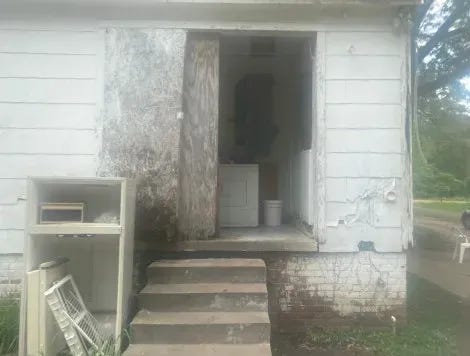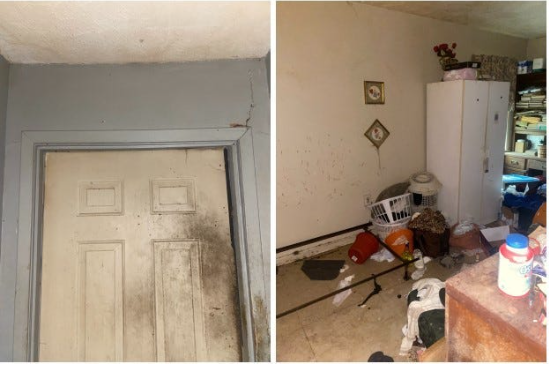By: Greta Kemp Martin
In communities across Mississippi — from Gulfport to the Delta, from Jackson to Ellisville — vulnerable adults are paying nearly all their monthly income to live in places most of us wouldn’t enter without gloves and a flashlight.
I’m talking about unlicensed personal care homes.
These aren’t licensed group homes with inspections, oversight and minimum care standards. These are often houses, sheds or trailers operated without any license, accountability or regulation. Horrifically, they are being used to warehouse Mississippians with mental illness, disabilities and nowhere else to go.
Disability Rights Mississippi has spent years investigating these facilities — documenting neglect, financial exploitation and dangerous conditions. At the start of the 2025 legislative session, we delivered our findings in a public report, “Unlicensed Personal Care Homes in Mississippi: A Crisis of Neglect, Financial Exploitation, and Unsafe Living Conditions.” The crisis is real and preventable, and the evidence is now in their hands.
Though Disability Rights Mississippi has long been sounding the alarm about unlicensed personal care homes, the silence from state leaders is deafening. This is a crisis that could be prevented. The legislature could fix it. It’s not complicated policy; it’s just a matter of priorities.
What exactly are personal care homes?
Personal care homes are residential facilities that offer food, shelter and assistance with daily living for individuals who need support but don’t require full-time medical or nursing care. These includes adults with disabilities, older Mississippians and people with serious mental illness. In Mississippi, the state Department of Health is responsible for licensing and regulating two types of personal care homes: assisted living and residential living facilities. Licensed homes are required to meet minimum standards for safety, staffing, meals, medication assistance and accessibility. According to Mississippi Department of Health records, there are 197 personal care homes in Mississippi that are appropriately licensed.
Here’s the problem: If a facility houses fewer than four unrelated individuals or simply never applies for a license at all, it stays off the state’s radar entirely.
Unlicensed personal care homes exist in a regulatory dead zone, exploiting a loophole big enough to warehouse hundreds of Mississippians with no consequences. What happens when something goes wrong?
Great question.
If unlicensed personal care homes are operating without inspections, safety standards or potential penalties, it’s a green light for exploitation, fraud, abuse, neglect and even death.
What did Disability Rights Mississippi (DRMS, for short) find when we looked closer?
Our report documents four major systemic failures found during monitoring and investigations across the state:
- Dangerous and inhumane living conditions
We’ve seen residents living in uninsulated backyard sheds with walls made of hanging blankets and in homes with no electricity or working bathrooms. We have assisted people with disabilities trapped inside rooms with boarded-up windows and padlocked doors. One man was hospitalized with sepsis and hypothermia after his body temperature had dropped to 77.9°F following days without heat in a home that also lacked basic hygiene supplies. Operators often provide just one meal a day. Residents report not having access to clean clothes, clean water or even toilet paper.
Keep in mind: They’re paying for this. Most residents hand over every cent of their monthly Social Security check (often $800 to $1,000) not because it’s safe, but because it’s the only option they’ve been given. In exchange, they get a bare mattress in a locked room, often with no heat, no food and no working toilet. It’s not just financial exploitation — it’s the kind of quiet coercion that preys on desperation.
2. No real penalties for operators
If you run one of these homes without a license, you’re not breaking any enforceable law — at least, not in Mississippi. Operators who get caught simply move the residents to another house, change the address and start over. There’s no felony charge, no shutdown protocol, no system that bars repeat offenders from profiting off vulnerable adults again.
Other states work a little harder to get this right. Georgia fines operators $100 per bed per day and can pursue felony charges for abuse or neglect. Pennsylvania allows unannounced inspections and can remove residents immediately if they’re in danger.
In Mississippi, the doors just stay open.
3. State agencies and hospitals are still referring people to these places
One of the most infuriating findings from our monitoring is that many hospitals and state agencies are still referring people to unlicensed personal care homes. This is not out of malice, but because they’re out of options. Simply put, when it’s time for their discharge, people are desperate to get out. To leave the hospital, the prison, the institution, they need an address. Unfortunately, that can lead straight to an unlicensed, unregulated and unsafe home.
The pipeline is dysfunctional. Discharge planners are often working from outdated or unofficial lists. There’s no real-time system to show which licensed beds are open, and no coordinated plan for where people should go after stabilization. So, when someone is ready to leave the hospital, a state hospital, or even prison, the only thing standing between them and release is an address. One in four residents we interviewed landed in an unlicensed personal care home because that was the only address anyone could find.
4. The system punishes the good and rewards the bad
Let’s be clear: There are operators out there who want to do this right — people trying to create safe, stable homes for vulnerable adults. Mississippi’s licensing process is expensive, confusing and buried in red tape. The state offers no real technical assistance, no transition support, no meaningful guidance.
Meanwhile, the bad actors operate with impunity. They run multiple unlicensed homes under the radar, charge residents $800 to $1,000 for food and shelter, and often collect Social Security benefits as the designated payee. The people doing it right are burning out. The people exploiting the system are profiting.
This is not a new problem.
Back in the 1980s, a state health official scaled the fence of a personal care home in Jackson only to find residents so malnourished, so neglected, they were near death. Forty years later, such horrors remain. Unlicensed personal care homes still proliferate, still unchecked, still profiting off the most vulnerable people in our state.
Why should we care about this?
Most of the residents in these homes are people with disabilities. Many are legally classified as “vulnerable adults” under state law. That means they are entitled to protections under the Americans with Disabilities Act and other civil rights laws.
Disability Rights Mississippi has documented conditions that violate human decency and federal law, encompassing inaccessibility, neglect, lack of reasonable accommodations and systemic discrimination. This is a result of what we call the “wild, wild west of regulations.”
We’ve filed more than 20 injunctions in courts across the state (like this one in south Mississippi). We’ve won most of them. But this approach is not sustainable. We are not prosecutors. We don’t have enforcement power. Most importantly, court orders don’t change statutes.
That is the Mississippi Legislature’s job.
And again: This is not a new crisis. There is a bill about personal care homes almost every session. Most are half-measures that don’t go far enough and manage to die a quiet death in committee. (There was this one and this one, and those were just during the last legislative session.) The issue has been covered by Mississippi news outlets again and again. State agencies know. Lawmakers know. This crisis persists not because we don’t understand it, but because the legislature keeps choosing not to fix it.
What should happen next?
It’s not enough to name the problem. We need real, workable solutions. In our report, DRMS outlines a legislative and policy roadmap to address this crisis head-on. The following is a how-to guide on how the Mississippi Legislature could remedy this issue.
- Make it a criminal offense to operate a personal care home without a license
How this happens:
This requires a change to Mississippi Code § 43-11-25. Right now, only those who once had a license and let it lapse face fines and misdemeanors. A new bill would need to amend this statute to:
- Define any operation of an unlicensed personal care home as a criminal act
- Distinguish between first-time offenses and repeat violations (e.g., misdemeanor vs. felony)
- Include enhanced penalties if harm or death occurs in an unlicensed setting (like this death at an unlicensed personal care home in Jackson in 2021)
Who should make it happen:
The Mississippi Legislature (specifically, members of the Public Health and Welfare committees in both the House and Senate) would need to draft and advance the bill. The state Attorney General’s Office would need enforcement authority, and coordination with the Mississippi Department of Health (MDH) would be necessary.
2. Close the loophole on resident limits
How it happens:
Mississippi’s current statutory definition of a personal care home only applies to homes with four or more unrelated residents. This gives bad actors an easy way to skirt regulation by spreading residents across multiple addresses or housing people in tents and sheds.
A legislative fix would:
- Redefine “institution for the aged or infirm” in Miss. Code § 43-11-1 to apply to any home providing food, shelter and personal care for unrelated individuals, regardless of the number
- Count residents on the property — not just in the main building — to block the “tent loophole”
- Link operators across multiple properties to prevent avoidance via address-jumping
Who should make it happen:
This is squarely within the legislature’s power. The Mississippi Department of Health would need updated rule-making authority to enforce the broader scope, and agencies like Medicaid, Adult Protective Services and law enforcement would need to use the updated definition in their investigations and placements.
3. Create penalties for hospitals and agencies that refer to unlicensed homes
How it happens:
Mississippi must adopt internal placement protocol rules within hospitals, state agencies such as the Mississippi Department of Mental Health, and the VA to prohibit referrals to unlicensed facilities. Alabama has this one in the books. Hawaii has it figured out as well.
In statute, this could:
- Require all state hospitals and agencies to verify licensure status before discharge or placement
- Penalize employees or agencies that knowingly refer to unlicensed personal care homes especially where personal or financial relationships exist
- Audit hospital discharge records for compliance
Who should make it happen:
This could be implemented in two ways:
- By law, through a bill requiring licensure verification prior to discharge or referral, with penalties for violations
- By executive order or agency rule, with the Mississippi Department of Health, Department of Mental Health, and Medicaid creating internal rules prohibiting referrals to unlicensed homes
Oversight by the state auditor and attorney general could be added for enforcement.
4. Develop a transitional licensing process with support for good operators
Mississippi needs a middle ground between “totally unlicensed” and “fully compliant.” We don’t have to reinvent the wheel here. Louisiana provides comprehensive resources to help with the licensing process. Georgia has streamlined its guidelines to make operating with a license more achievable. This could take the form of a phased or provisional license, allowing operators to:
- Begin serving residents with minimal requirements
- Meet milestones over time to come into full compliance (e.g., fire safety upgrades, staff training)
- Receive state-provided technical assistance, mini-grants or access to pro bono consultants to meet compliance
A new rule or legislative act could authorize the Department of Health to offer such provisional licenses.
Who should make it happen:
MDH would need to adopt a new licensing category. The legislature could establish a pilot program and provide funding. Nonprofits or regional planning and development districts could be funded to provide technical support to transitioning homes.
5. Empower agencies to inspect and shut down dangerous homes
How it happens:
MDH can currently license homes and Disability Rights Mississippi can investigate by and through its protection and advocacy authority, but neither can forcibly shut down an unlicensed home unless they go through the courts. Currently, the Attorney General’s Office has a limited scope of what triggers its investigatory and enforcement powers in an unlicensed personal care home.
Mississippi needs:
- Expanded statutory authority for the AG’s Office to investigate and prosecute unlicensed personal care home operators
- Enforcement powers for MDH to issue cease-and-desist orders even for never-licensed facilities (check out California’s enforcement authority)
- Unannounced inspection rights for law enforcement and Adult Protective Services
- A standing interagency task force on personal care home regulation (Oklahoma has paved the path here)
Who should make it happen:
This would be a joint effort.
- The legislature can expand investigative and enforcement authority
- The Attorney General’s Office needs staff and resources to prosecute cases
- MDH and DMH must be able to coordinate inspections and share data
- The Governor’s Office could convene a task force or issue an executive directive in the short term
- Establish a public, searchable database of licensed personal care homes
How it happens:
Currently, MDH posts a PDF document of licensed homes, but it’s not updated in real time or searchable. It also does not include any unlicensed personal care homes that have been reported to MDH (which does happen). Mississippi needs a centralized, accessible database that:
- Updates in real time as licenses are granted or revoked
- Includes any reported unlicensed personal care homes
- Flags homes under investigation or in provisional status
- Is integrated into hospital and agency placement systems
- Can be cross-referenced by name, address, or operator
Who should make it happen:
- MDH should build and maintain the platform
- The legislature can fund the system through appropriations
- Hospital networks, the VA, and state agencies must be required to use it before making referrals
This isn’t hard — other states already have real-time dashboards. We just need to prioritize it.
Finally, a call to action:
- Call your state legislators and ask them what they’re doing to protect vulnerable adults in personal care homes
While this is a pervasive, statewide problem, the following is a list of target/problem counties where DRMS has received multiple complaints, conducted extensive monitoring activities, and/or filed for injunctive relief against unlicensed personal care home operators. While highlighted here due to the volume of complaints or legal action, these counties are not outliers; they are indicative of a statewide crisis. It is estimated that more than 300 unlicensed personal care homes may currently be operating across Mississippi, often in violation of basic safety, accessibility, and disability rights standards.
The problem counties:
- Bolivar County
- Copiah County
- DeSoto County
- George County
- Hancock County
- Harrison County
- Hinds County
- Humphreys County
- Jackson County
- Lauderdale County
- Noxubee County
- Pike County
- Sunflower County
- Warren County
2. Share the report
The full report is here. Link it in your emails, text it to friends, post it on social media. Make it impossible for elected officials to claim they didn’t know.
- Use your voice
Whether you’re a voter, a caregiver, a social worker or someone with a platform — talk about this. It’s not a niche issue. It’s a moral one.
Greta Kemp Martin is a Mississippi attorney, social justice advocate and lifelong southerner who believes “change travels on the back of a good story, a strong cup of coffee and the kind of grit that doesn’t ask permission.” She publishes The Magnolia Dispatch, where “law, policy and lived experience come home to roost.” A version of this article originally appeared in The Magnolia Dispatch.




